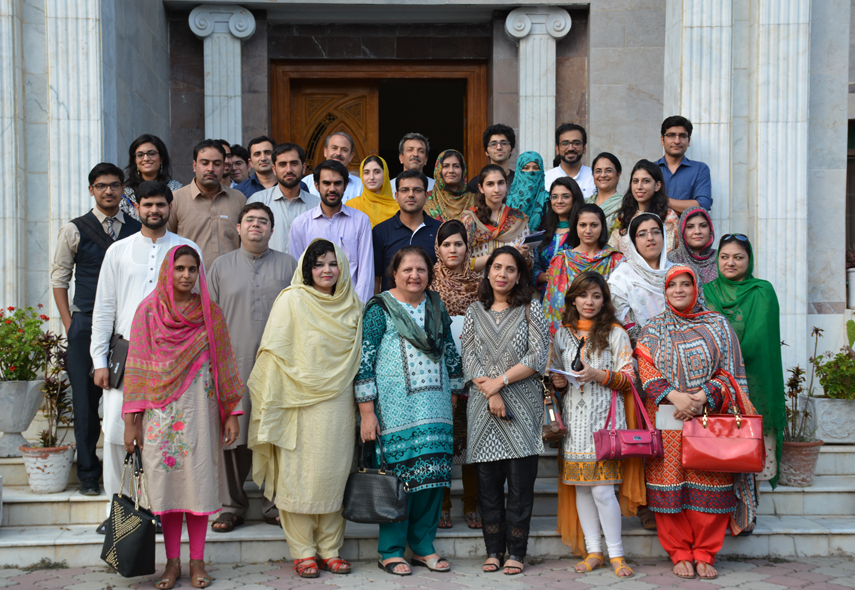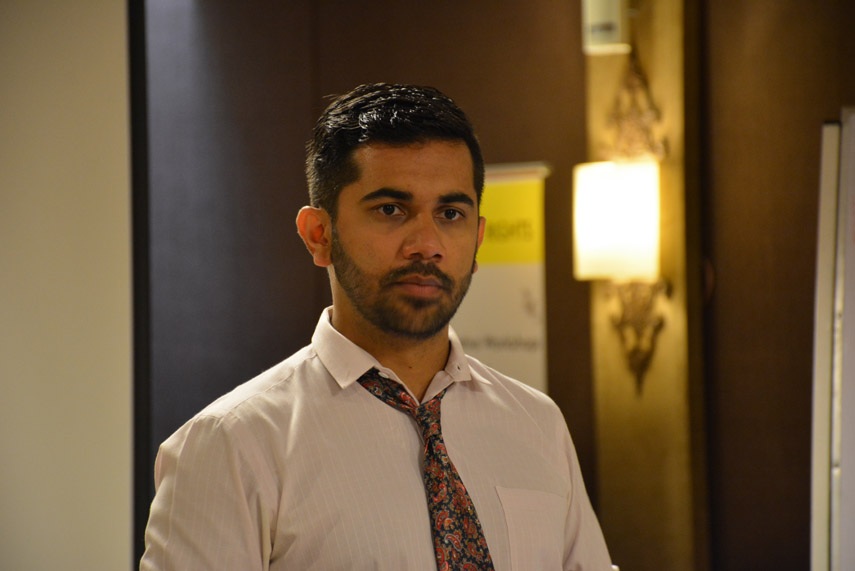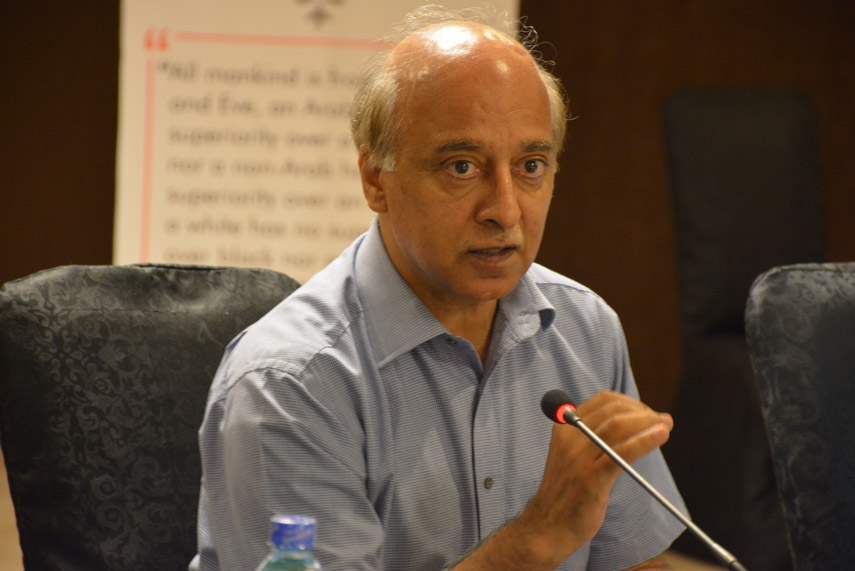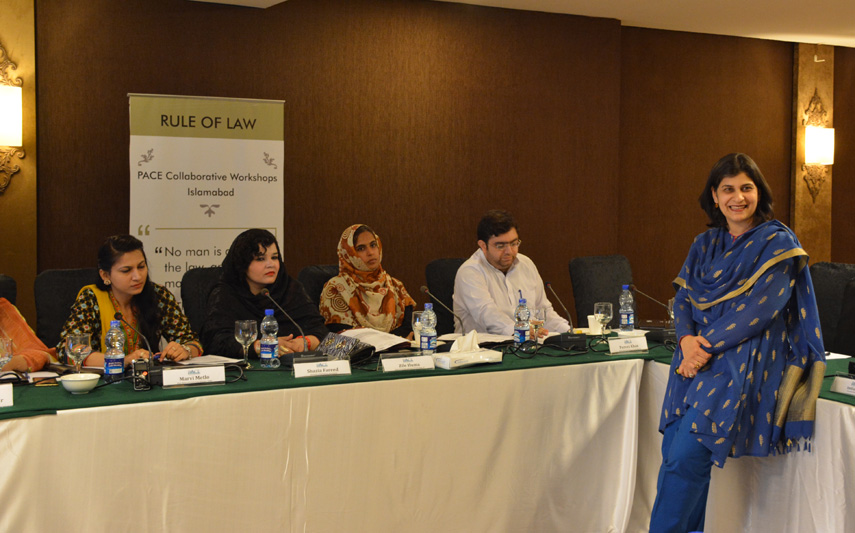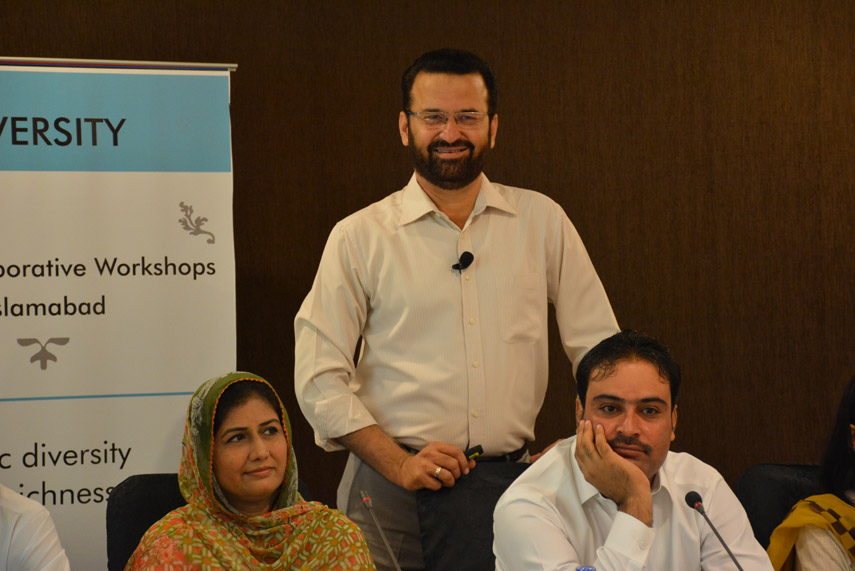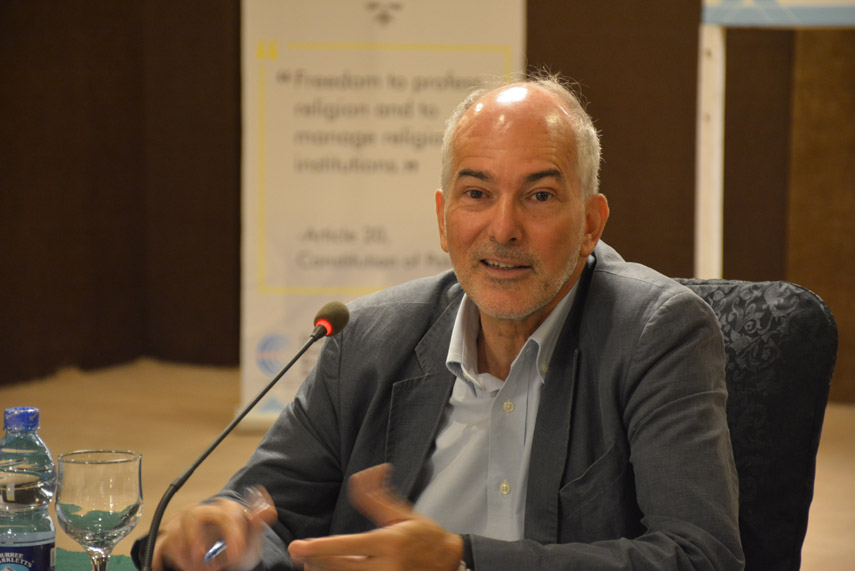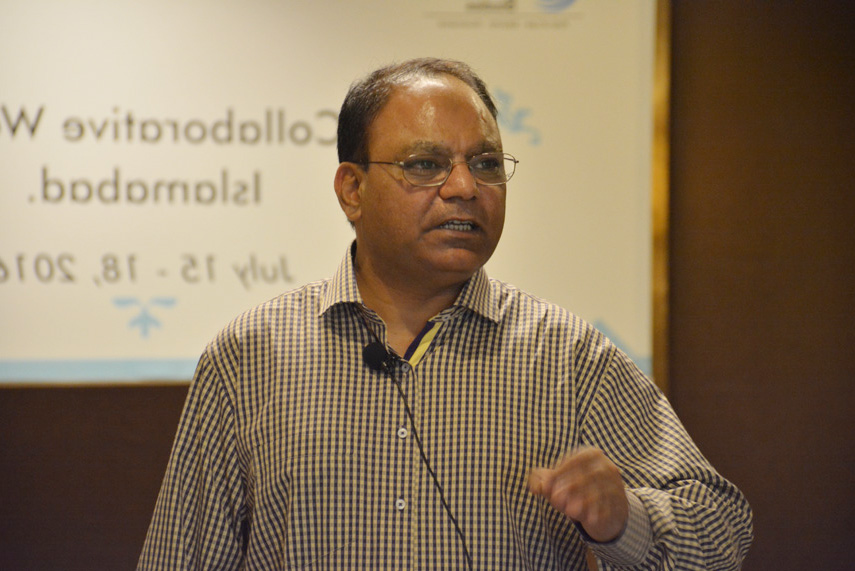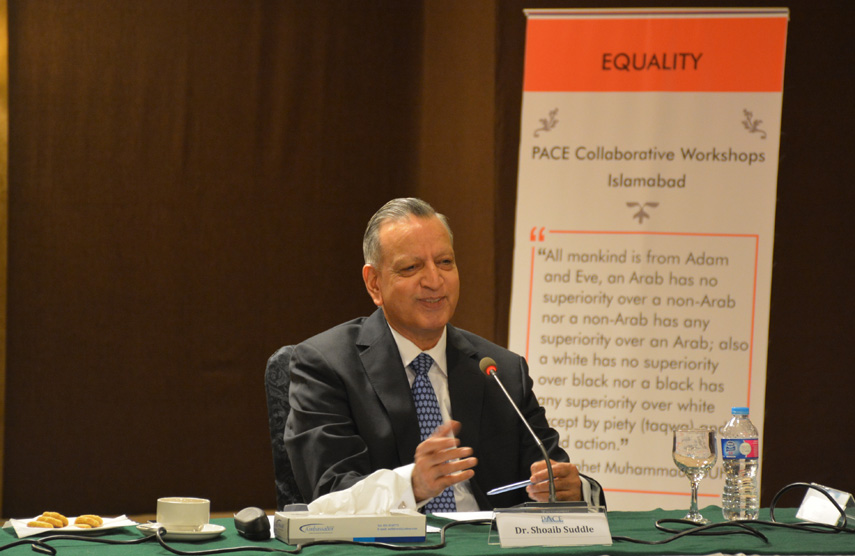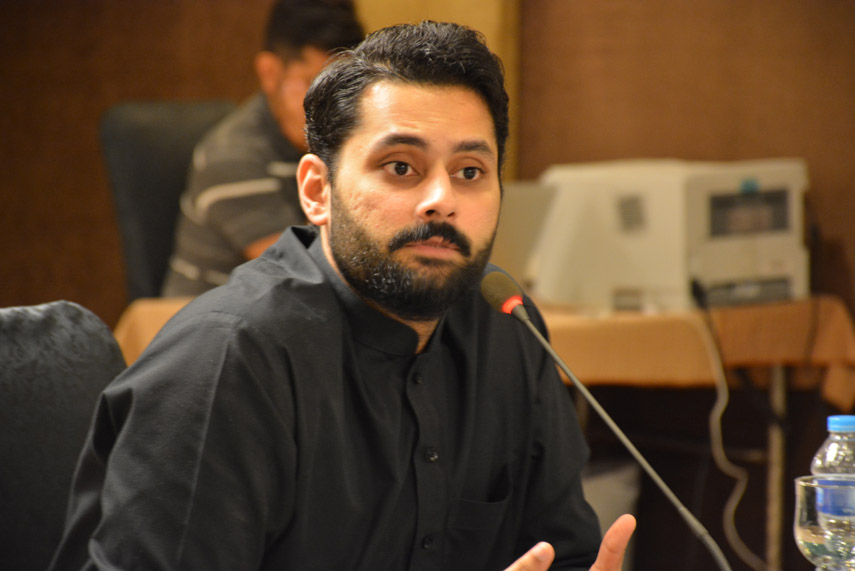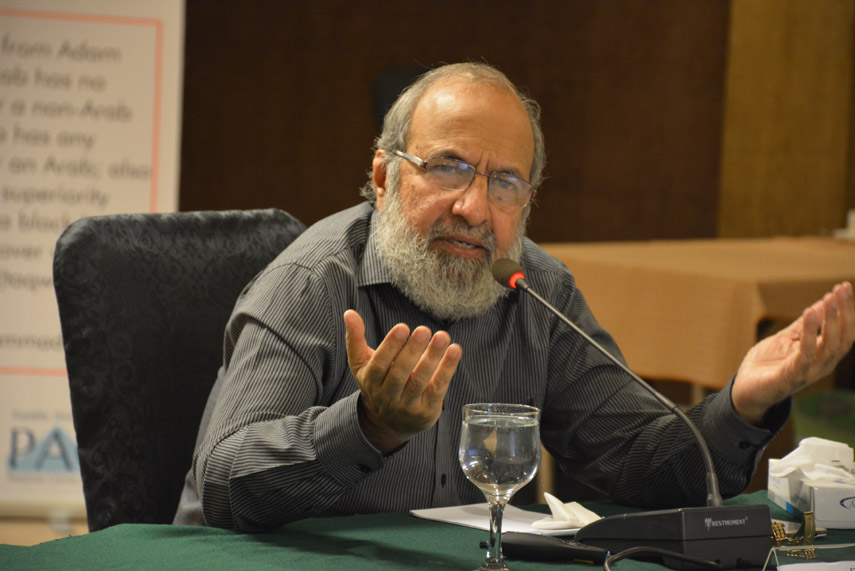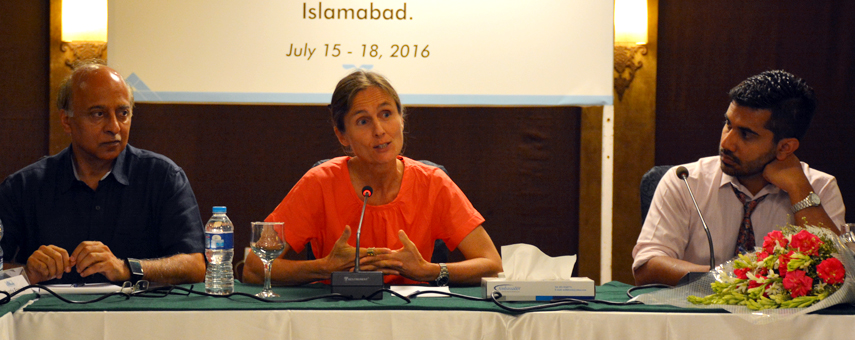The Center for Research and Security Studies (CRSS) conducted the fifth four-day collaborative workshop for young university lecturers and professors between July 15-18, 2016 at the Grand Ambassador Hotel, Islamabad. The workshop was conducted under the umbrella of the Pakistan Center of Excellence (PACE), a counter-radicalization, pluralistic values focused project, in collaboration with the Dutch Government. Participants included young university lecturers and professors from University of Lasbela, University of Malakand, University of Swat, University of Gomal, Shah Abdul Latif University Khairpur, International Islamic University Islamabad, Balochistan University, Quetta, Agriculture University, Peshawar, and Kohat University of Science and Technology.
Opening Ceremony
Mr. Zeeshan Salahuddin, Project Manager PACE, and Director Communications and Strategy at CRSS, welcomed participants to the workshop, saying that PACE is put together by CRSS to counter radicalization, inculcate critical thinking, question preconceived notions and narratives, and embed the national discourse in constitutionalism and the rule of law. He stressed that PACE inculcates the universal values of tolerance and acceptance; tolerance is one virtue that leads to a range of other ideas such as perseverance, coexistence and the idea of peace building. He asked participants to apply their learning here in their own lives and, particularly, the lives of their students.
[read more about Zeeshan Salahuddin]
Mr. Imtiaz Gul, Executive Director, CRSS elaborated on the objectives of the training saying equal citizenry is a concept which is guaranteed in all the constitutions of the developed countries, including Pakistan. After showing a brief video to the audience, Mr. Gul encapsulated some of the ideals that prompted the creation of PACE. He said that these ideals also resonated with the core values that are acknowledged, practiced and respected as fundamental to social harmony, political peace and national cohesion.
Workshop Core Areas
The young professionals were trained in following areas:
- Leadership and motivation
- Equal citizenry and respect for rule of law
- Fundamentals of democracy, governance and accountability
- Respect for diversity, opinions and rights
- Rights of minorities and other marginalized groups
- Constitutionalism, and adherence to Pakistan’s Constitution, particularly articles 8-28
- The importance of asking critical questions in the pursuit of knowledge
Workshop Modules
The resource persons and public intellectuals who interacted with the participating university lecturers and professors from different universities across Pakistan included Mr. Muhammad Jibran Nasir, Professor Saeed Minhas, Dr. Khalid Zaheer, Dr. Shoaib Suddle, Ms. Gulmina Bilal, Mr. Safiullah Gul, and Mr. Charles Petrie. The discussion themes we primarily rule of law, tolerance, respect for diversity, fundamental human rights, equal citizenry, democracy and governance, and perhaps most importantly, the importance of questioning the narratives that are presented before us.
Ms. Gulmina Bilal kicked off her session on the topic of democracy and good governance. Separation of power, pluralistic system, independent judiciary, free and independent media, respect for rule of law, accountability and transparency were shared and discussed as basic elements of democracy. She also spoke on how accountability may be used as a prerequisite for successful democratic systems and how democracy stabilizes with able leadership. In a democratic system, everyone is supposed to perform their duties honestly. Good governance, strong institutions and able leadership emerge in the societies where people have equal access to education, capital, opportunities and freedom.
[read more about Gulmina Bilal]
Mr. Safiullah Gul, bureau chief for a private television channel in Peshawar, conducted a session on leadership and motivation where he emphasized the extent to which effort is directed towards a goal, and its components: activation, persistence and intensity. His session, filled with activities to enhance creative and critical thinking, focused on looking at things from a slightly different perspective to encourage problem-solving.
[read more about Safiullah Gul]
Mr. Charles Petrie spoke on what to expect from the UN and international organizations in Pakistan. The west is in complete deficit of inspired and informed leadership; to a certain limit, the Chancellor of Germany has proved herself as a good leader by welcoming the Syrian refugees. The latest example of this is Brexit: Brexit was an irresponsible dare by a group of politicians who were convinced that it would not pass. Brexit has typified the vacuum in leadership and ideology in Europe today.
UN is basically the default response for conflicts which international community is not interested. The UN peace keeping has become a parody of what it was in the past. Without political will, you can do as much peace keeping as you want but it won’t work. He said that the UN has become a bureaucracy that delivers services in a very heavy way and for him, the UN has lost its way, because the leadership has not been able to demonstrate its commitment to the principles of the organization. UN is now faced with two choices; a) either reform and become relevant or, b) become irrelevant.
Violence is one thing that denies people their basic right to live and leads to destruction. People can be traumatized with violence as part of the world politics. Oppression creates absolute despair. Differences should push to dialogue, instead of violence and destruction. If in a society, the mechanism of rule of law is not working properly, it can lead to a destructive society.
Differences should open up a dialogue, instead of leading to violence and destruction. There are two points which are very important for survival, i.e. struggle hard and never give up. This is the only thing which can keep people moving on with their lives.
[read more about Charles Petrie]
Mr. Saeed Minhas was the final speaker of the second day; he kicked off his session with the fundamentals of democracy, governance & accountability. He said that democracy is a form of government in which the rulers are elected by the people and shared a very famous definition of democracy by Abraham Lincoln, “Democracy is a government of the people, by the people and for the people.” He further elaborated that in a democracy, the final decision making power must rest with those who are elected by the people, it must be based on a free and fair election, and on fundamental principles of political equality. He also spoke about the merits and demerits of democracy.
Modern democracies involve such a large number of people that it is physically impossible for them to sit together and make a collective decision. Even if they could, the citizen does not have the time, the desire or the skills to take part in all the decisions.
Mr. Minhas defined governance as “the exercise of political power to manage a nation’s affairs.” He described three factors of governance as state, civil society and market. Public sector management, accountability, legal framework for development, transparency and information are the most important components of good governance. He shared that good governance must have the characteristics of accountability, transparency, responsiveness, inclusiveness, effectiveness and efficiency, should follow the rule of law, participatory and consensus oriented.
[read more about Saeed Minhas]
Dr. Shoaib Suddle spoke about the fundamentals of democracy, governance and accountability. He said that democracy is a form of government in which people are at the center, directly or indirectly through their chosen representatives. People are considered to be the driving force in democratic systems. Parliament is supreme and people indirectly par-take in decision making. They all have the right to dissolve such governments who are not delivering.
No system is considered to be perfect, all of them have their plus and minus points. But a nation’s responsibility is to struggle for a flawless system which can be formed through a transparent manner. Important principles of democracy are rule of law, separation of power, tolerance, freedom of opinion and transparency and accountability.
[read more about Dr. Shoaib Suddle]
Mr. Jibran Nasir started second session of the day and he spoke on the topic of tolerance. He referred to the Articles 8-28 of the constitution as they deal with the fundamental rights of citizens and no one is allowed to deprive them of it. One tends to develop a certain kind of attitude towards a certain ethnic, cultural and religious group, if brought up in an environment that is not tolerant. Argument and reasoning needs to be done in a positive way to correct conflicting views. Tolerance is something that expands with exposure to different levels and learning more about diverse groups. One should be open and accommodating to all the differences that exist in a diverse society.
Speaking about the ethical values of the society, Mr. Jibran said that social media is playing a vital role in it. It can portray anyone as good or bad. If we view ourselves as belonging to the former, we are not supposed to follow what we think is bad on social media. Criticism should be constructive and positive.
[read more about Jibran Nasir]
Dr. Khalid Zaheer kicked off the last day of the workshop and spoke on the topic of religious intolerance. He shared that religious tolerance is a right everyone should give to others to believe in and practice the faith of their own choice. We have no right to impose our beliefs on others. Our attitude towards other’s beliefs should be genuine and positive. People usually believe in and practice ideas and beliefs what they have learnt from their elders or what they have been convinced by.
We should not be abusive and violent towards the people who are not of the same belief as what we believe in. Everyone has the right to do whatever they want and believe. Being humans, we expect others to tolerate us; same is what they expect from us.
[read more about Dr. Khalid Zaheer]
Her Excellency Ambassador Jeannette Seppen of The Netherlands, during the closing ceremony of Pakistan Center of Excellence’s (PACE) fifth round of collaborative workshops said that as a child, she was always encouraged in her school to ask why, to speak out about things that agonized her. She was provided with responses and grievances to address. This is crucial for critical thinking, which leads to a nation and peace building. She shared with the participants that Europe suffered greatly because there was not enough critical thinking in its history. Despite being one of the most highly educated parts of the world, people followed a doctrine of divisiveness without thought during WWII.
In her concluding remarks she appreciated the efforts of CRSS saying that the Dutch government is proud to be able to host events like PACE, as they encourage critical thinking and discourse. “It is better to allow all these diverse colors to blend, to blossom, than having one singular, bland color.”
Imtiaz Gul, Executive Director, CRSS, spoke about the importance of nation building and national cohesion, referring particularly to The Netherlands as an example Pakistan can learn from. He also stressed the importance women can play in the social fabric of society and how they can aid in bringing about social harmony.

